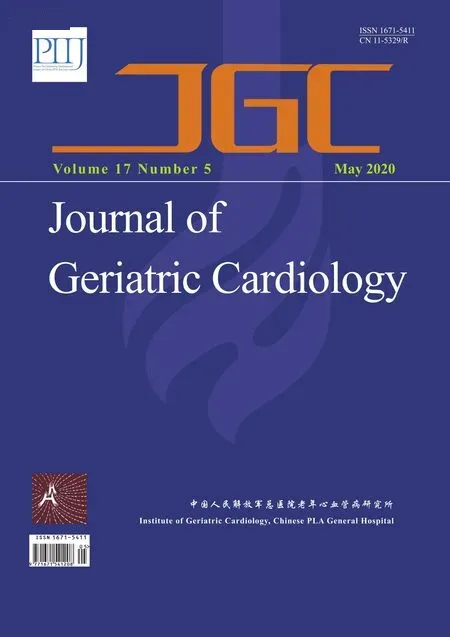Scientific statement of the Chinese Society of Cardiology (CSC) on using of renin angiotensin system blockers in patients with cardiovascular disease and COVID-19
Ya-Ling HAN, Yu-Ming LI, Chang-Sheng MA;
Keywords: Angiotensin converting enzyme; Cardiovascular disease; COVID-19; Scientific statement
The coronavirus disease 2019 (COVID-19), which is caused by SARS-CoV-2, has become a worldwide public health crisis. Published clinical data from China and other countries have shown a much higher risk of developing COVID-19 and dying from the disease among the elderly,especially among those who had preexisting hypertension,cardiovascular diseases (CVD) and diabetes mellitus.[1]
Similar to SARS-COV-1, SARS-CoV-2 also belongs to beta-coronaviruses genera,[2,3]and both enter human cells through the angiotensin-converting-enzyme 2 (ACE-2) receptor.[4]ACE and ACE-2 are the two key regulatory enzymes that counter-balance each other in the renin-angiotensin system (RAS).[5,6]
Chinese physicians and scientists found that RAS played a significant role in the pathogenesis and pathophysiological development of COVID-19. A prospective observational study reported that 12 confirmed COVID-19 cases all developed pneumonia and half of them developed acute respiratory distress syndrome (ARDS). In addition, the angiotensin II level in the plasma sample from the COVID-19 patients was significantly elevated compared with healthy controls and linearly associated with viral load and lung injury.[7]It is suggested that SARS-CoV-2 might cause RAS over-activation to induce an inflammatory/cytokine storm,which leads rapidly to acute respiratory distress syndrome and even respiratory-circulatory failure.
Robust evidence from a lot of clinical studies has demonstrated that RAS inhibitors (ACE inhibitors (ACEI) and angiotensin receptor blockers (ARB)) are essential for controlling blood pressure and reducing the risks of adverse cardio- and cerebro-vascular and renal outcome events to improve the prognosis of patients with hypertension, diabetes, CVD as well as chronical kidney disease. Yet, there are minimal clinical studies with enough sample size that showed clear effects of ACEI or ARB on lung injury in patients with 2019-nCoV-2 infection. Recently, Chinese scholars reported the clinical characteristics and outcomes of 112 patients with COVID-19 infection and preexisting cardiovascular disease,[8]and found no significant differences in the proportion of patients using ACEI/ARB, neither between the serious and normal patient groups, nor between the death and recovery groups. It suggested that in patients with CVD,ACEI/ARB would not increase the incidence and mortality of COVID-19.
Recently, European Society of Cardiology, European Society of Hypertension, Heart Failure Society of American/American College of Cardiology/American Heart Association and International Society of Hypertension have issued statements respectively,[9-12]which expressed consistently that there is no clinical or scientific evidence to support the change or discontinuation of the use of ACEI/ARB in patients with COVID-19.
Therefore, the Chinese Society of Cardiology issued the statement with prudence and carefulness in clinical practice for patients with CVD (including hypertension, coronary heart disease, heart failure, etc.) and diabetes or kidney disease:
(1) Those who are not infected with SARS-CoV-2 should continue taking the previously effective ACEI/ARB.
(2) Those who are infected with SARS-CoV-2, even those with moderate pneumonia should continue taking ACEI/ARB.
(3) Regardless of whether the SARS-CoV-2 infection is confirmed, if there is an overt change in blood pressure or CVD symptoms, the patients should immediately see his physician or consult a cardiologist and then adjust the relevant medications or dosage according to medical doctor’s advice.
(4) For COVID-19 patients with severe pneumonia, respiratory support, anti-infection, maintaining hemodynamics should be well implemented, meanwhile the use of ACEI/ARB should be individualized according to the disease status.
(5) COVID-19 patients should be managed based on evidence-based medicine in routine clinical practice. Further studies are necessary to explore the effects of RAS inhibitors on the COVID-19.
 Journal of Geriatric Cardiology2020年5期
Journal of Geriatric Cardiology2020年5期
- Journal of Geriatric Cardiology的其它文章
- Midventricular Takotsubo syndrome
- What is the cause of the neck hematoma? A rare complication of percutaneous coronary intervention of acute coronary syndrome: a case report
- Ischemia/hypoxia inhibits cardiomyocyte autophagy and promotes apoptosis via the Egr-1/Bim/Beclin-1 pathway
- Sagittal abdominal diameter as a marker of visceral obesity in older primary care patients
- Association of frailty with all-cause mortality and bleeding among elderly patients with acute myocardial infarction: a systematic review and meta-analysis
- Association between serum uric acid level and endothelial dysfunction in elderly individuals with untreated mild hypertension
